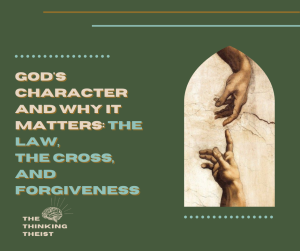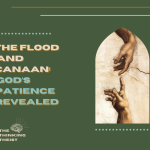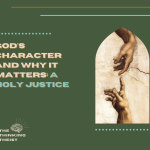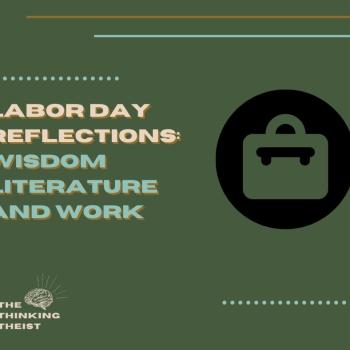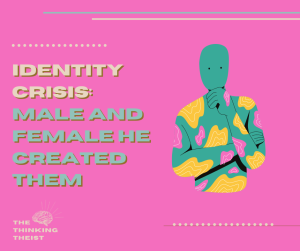God’s Character Thus Far
In previous articles, we have dove into different aspects of God’s character. So far, we have seen God’s grace and mercy being shown to humans that do evil and, wishing for repentance and reconciliation, we’ve seen His patience acted out towards people until the last possible moment. As we’ve seen, this seems to always be Yahweh’s first goal. It is only when humans pass a threshold of always wishing to do evil and always acting out in evil, that God’s judgment is felt. The Flood and the removal of the Canaanites were two such examples. You can see the previous article for more on this.
We’ve also seen that these character traits push Christians to action. After all, if God is gracious, merciful, and patient, what does this mean for us as image bearers? In one sense, as His image bearers, we are to be His ambassadors in the world, seeking to show mercy, grace, and patience to the unbeliever. In doing this, we pray to bring more people into the Kingdom of God in order for them to know Christ and experience His glory for forever.
Back to the Good Book
Let’s revisit the passage we have gone to and see if there is another trait we can find. Exodus 34: 6-9 states:
“’The Lord, the Lord, a God merciful and gracious, slow to anger, and abounding in steadfast love and faithfulness, keeping steadfast love for thousands, forgiving iniquity and transgression and sin, but who will by no means clear the guilty, visiting the iniquity of the fathers on the children and the children’s children, to the third and the fourth generation.’ And Moses quickly bowed his head toward the earth and worshiped. And he said, ‘If now I have found favor in your sight, O Lord, please let the Lord go in the midst of us, for it is a stiff-necked people, and pardon our iniquity and our sin, and take us for your inheritance.’”
As stated before, we’ve seen God’s grace, mercy, and patience show itself, and have found these traits to be trustworthy. The next character trait of God that we will dive into is this: Yahweh is forgiving.
God is a forgiving God. He forgives iniquity, sin, and transgression. From sins as small as lying to sins at big as murder and genocide. Our Big God forgives big.
The Law and Forgiveness
I’ve briefly touched on God’s covenant with Israel in previous articles. But I think outlining the covenant relationship between Israel and Yahweh is important before understanding Old Testament Law. The Covenant between Yahweh and Israel begins in Genesis 12 (I am separating this covenant from the Noahic covenant purposely). The terms of the covenant are shorter in this chapter and are more drawn out in chapters 15 and 17, so for brevity sake, I will simply outline the terms of the covenant.
In Genesis 12, God promises the following:
- Yahweh will bless those who bless Abraham and will curse those who curse him.
- All families of the earth will be blessed through him.
In Genesis 15, God promises the following to Abraham:
- Yahweh would protect him, and his reward would be great
- Yahweh would provide him with an heir
- Abraham’s descendants would be as countless as the stars
- The Lord promised to free His people from future bondage
- Yahweh said He will punish the nation that enslaves them
- God will bring His people to the land of the Amorites (see previous article)
This covenant is repeated in Genesis 17. I’ll outline it here but feel free to read it for yourself. The Covenant is as follows:
- Abraham is to serve Yahweh faithfully, living a blameless life.
- Yahweh will give Abraham countless descendants
- Abraham will be the father of a multitude of nations
- Yahweh will confirm His covenant with Abraham’s descendants
- The mark of the covenant would be circumcision of all males in Abraham’s family and his descendants
The Faithfulness of Yahweh
Here we see a continual faithfulness of Yahweh, and a continual promise being given to Abraham and his family. What’s more is that just as promised in the covenant with Yahweh we see God renew this covenant with the descendants of Abraham:
- God’s covenant is renewed for Moses, Aaron, and the nation of Israel when The Law is given on Mount Sanai
- The covenant promises are repeated with David and his kingdom
- Yahweh’s covenant is fulfilled now because of Jesus of Nazareth
This is the context for which to understand God’s forgiveness: A Covenant Relationship.
And as we will see, God’s forgiveness seems to be based on repentance; in The Law, this meant sacrifice.
The Role of the Law In the Life of Israel
Before we dive into God’s forgiveness as found in the Law, it is important to note that Abraham was found righteous to God not because of his works but by his faith in Yahweh. In other words, Abraham didn’t earn his way to being a part of the covenant. Yahweh called him, and he responded.
In the same way, Moses did not find favor with God simply because he did stuff. If anything, he didn’t deserve God’s favor. But out of His grace and mercy, Yahweh used Moses to free His people out of slavery in Egypt.
When we get to the Law in Leviticus and then later in Deuteronomy, we must understand that the same “saved by faith alone” theme that comes out of the New Testament, is the same “saved by faith alone” idea that we see reflected in the Old Testament.
As Christ followers, we are saved by faith alone in Christ alone. Yet, this doesn’t mean that we keep on with the same way of living. We are saved from a life of committing evil, to a life of good, and then to eternal life.
I believe that this is the same for the people of Israel when Moses received the law. The Law of Leviticus is supposed to point to how Israel is to relate to God. Following the Laws in Leviticus wasn’t what saved the people of Israel, it was first faith in Yahweh, which then led to the fruit of following the Law.
In other words, Faith in Yahweh is the root, while following The Law is the fruit.
The Sacrificial System and Sin
Among the many laws In Israel, there is a chunk dedicated to the forgiving of sins. This was primarily done through the sacrificing of animals. This seems barbaric to us today. But, in my mind, for God to meet His people where they were in a 14th century B.C. context is an example of His wisdom and grace towards them.
In Leviticus 5, we see a couple of steps on restoring a person’s relationship with the Lord. First, we see a couple of if-then clauses. Then we see this:
“When you become aware of your guilt in any of these ways, you must confess your sin. Then you must bring to the Lord as the penalty for your sin a female from the flock, either a sheep or a goat. This is a sin offering with which the priest will purify you from your sin, making you right with the Lord.” – Leviticus 5: 5-6
Awareness of guilt means one must confess. The person must then make a sacrifice to the Lord to show that he or she feels guilty. This is to make up for the wrong that is committed against Yahweh and His people, Israel. A sin against God was a sin against Israel.
Why This System?
Some of you who are reading this for the first time may be thinking, “This seems a little barbaric. Why would Yahweh require such a grotesque ritual?”
I have a couple of thoughts:
- First, I think it is easy to look at events 3,000+ years ago and call them barbaric.
- Second, I think that we need to understand that we do the same thing. Not with animals, but with actions and movements towards ‘making up’ to the person we have wronged.
- Third, this sacrificial system was meant to point to an even greater sacrifice to come: Christ on the cross of Calvary.
Another thing we must notice is that after this passage, God ordains different sacrifices for people of a different socio-economic status. If you can’t find a goat, or a sheep, 2 turtle doves are fine. If you can’t get any turtle doves, bring some flour.
It seems that it isn’t the act of bringing something that matters to The Lord, but the heart of repentance shown by the one who committed the wrong.
How Does the Sacrificial System Show God’s Forgiving Attitude?
I think that we must understand that God is Holy. In other words, He is totally set-apart from us. Isaiah 55: 6-9 points to this idea:
“Seek the Lord while you can find him.
Call on him now while he is near.
Let the wicked change their ways
and banish the very thought of doing wrong.
Let them turn to the Lord that he may have mercy on them.
Yes, turn to our God, for he will forgive generously.
‘My thoughts are nothing like your thoughts,’ says the Lord.
‘And my ways are far beyond anything you could imagine.
For just as the heavens are higher than the earth,
so, my ways are higher than your ways
and my thoughts higher than your thoughts.’”
God being Holy and different from us entails that His justice is greater than ours, His mercy and grace is greater than ours, His love and anger are greater than ours, and His capacity to forgive is way greater than ours.
While we may believe that there are some people that are beyond forgiveness, God provided a way for all to be forgiven.
God providing a sacrificial system for His people under the old covenant to relate to Him and to gain forgiveness for iniquity is the epitome of humility and grace. Through this system, God forgives their sins, while seeking a repentant heart for His people.
The Sacrificial System and the Cross
As I’ve said before, the sacrificial system is to point to a greater sacrifice that would cover the sins of all His people. Let us look at a description of the Jewish Messiah:
“Yet it was our weaknesses he carried.
it was our sorrows that weighed him down.
And we thought his troubles were a punishment from God,
a punishment for his own sins!
But he was pierced for our rebellion,
crushed for our sins.
He was beaten so we could be whole.
He was whipped so we could be healed.
All of us, like sheep, have strayed away.
We have left God’s paths to follow our own.
Yet the Lord laid on him
the sins of us all.”
- Isaiah 53: 4-6
There would be a time when the sins of God’s people would not be carried by a bull, a ram, grain, or flour; there would be a time when the weight of our evil actions would lay upon the shoulders of Yahweh’s suffering servant, Jesus, who willingly went to the cross for our forgiveness. He bore our iniquity, and the consequences for our evil doing.
And now by faith in Him, we no longer need to sacrifice bulls or rams, but instead lay our lives at the throne of Christ who rose from the dead victoriously.
This is what the sacrificial system was to point to.
Conclusion
Christian, as the one who has been forgiven much by God, seek to forgive others relentlessly.
If you are wronged, forgive.
If you are persecuted: forgive.
When you are hurt, bruised, or scorned: forgive.
And if you wrong someone else: humble yourself, admit your fault, and try to make it right. It is not easy. In fact, we shouldn’t expect it to be easy. It’s something the apostles struggled with when they were following Jesus. But always seek to forgive just as Christ forgave us.
I want to leave you with an interaction between Peter and Jesus because I think it is very fitting.
“Then Peter came to him and asked, ‘Lord, how often should I forgive someone who sins against me? Seven times?’
‘No, not seven times,” Jesus replied, ‘but seventy times seven!’”
Matthew 18: 21-22


